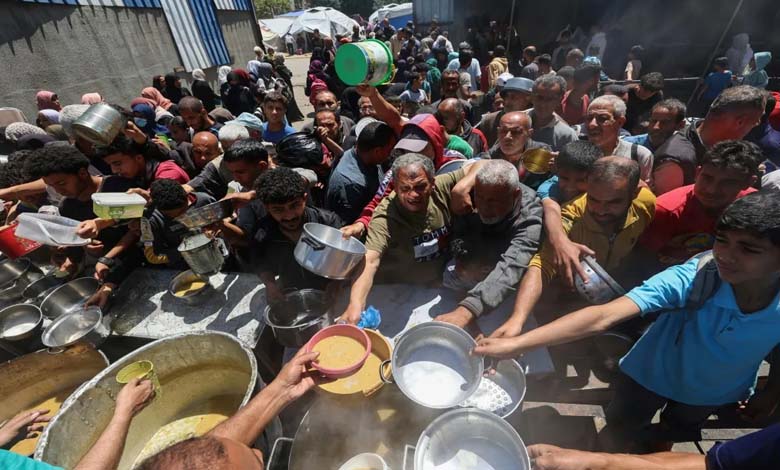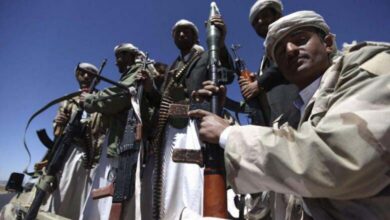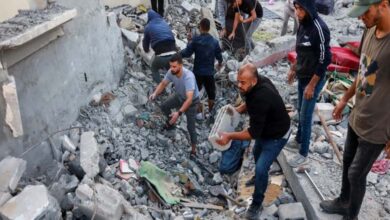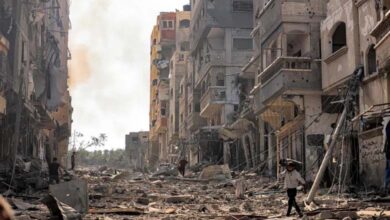Gaza War: 700 Days of Bombardments, Displacement, and Famine

Today marks the 700th day of war in Gaza, as Israel intensifies its airstrikes on various parts of the enclave, while famine continues to claim lives.
Every morning, residents wake up to the sound of bombings, to images of bloodshed, and to the pervasive smell of death. This painful daily reality has not ceased since the Hamas attack on southern Israel on October 7, 2023, which ignited the war.
-
Gaza War: 700 Days of Bombardments, Displacement, and Famine
-
Israel warns Gaza tower residents before targeting it and calls for evacuation of the city
Israel continues its plan to seize control of the Palestinian territory despite mounting international and domestic pressure calling for an end to the conflict. Last month, the United Nations officially declared famine in Gaza.
On Friday, the Palestinian news agency, citing medical sources, reported that dozens of people were killed at dawn in strikes targeting homes and tents sheltering displaced people in Gaza City.
That same day, Hamas’s armed wing released a video showing two Israeli hostages held in Gaza since the October 2023 attack. The footage, lasting more than three and a half minutes, shows one hostage in a car driving through destroyed buildings, addressing Prime Minister Benjamin Netanyahu in Hebrew, pleading with him not to launch the planned military assault to take over Gaza City. At the end of the video, the hostage appears with another captive, stating that the recording was made on August 28 in Gaza City. AFP, however, could not verify the authenticity of the footage.
-
US sanctions three Palestinian organizations for calling for an investigation into the Gaza war
-
Before the Battle to Invade Gaza… Israel Between Military Mobilization and Soldiers’ Reluctance
The war enters its 700th day as Israel announces it now controls 40 percent of Gaza City, the largest urban center in the enclave, and is preparing a new offensive to seize it entirely. In a previous video statement, army spokesman Evi Dverin declared: “We currently control 40 percent of Gaza City. The operation will continue to expand and intensify in the coming days. We will increase pressure on Hamas until its defeat.”
In recent days, Israel has stepped up its bombardments around Gaza City. Last week, the army declared the area a “dangerous combat zone” and ordered its evacuation. However, the International Committee of the Red Cross deemed the evacuation “impossible” and “unfeasible.”
-
Bloody night in Gaza: 13 killed in dawn airstrikes as tanks storm the city
-
Washington Considers a Ten-Year Trusteeship Over Gaza
Famine and Displacement
According to UN estimates, about one million people live in Gaza City and its surrounding areas, the very zone where the UN confirmed in late August that famine was occurring. Witnesses reported that thousands of Palestinians have fled the city in recent weeks.
On Wednesday, a senior Israeli military official stated that Israel expected “one million” people to flee southward. On Thursday, a military spokesperson accused Hamas of threatening civilians to prevent them from leaving the city.
Meanwhile, protests erupted in Jerusalem demanding that the government agree to a ceasefire in Gaza that would ensure the release of hostages. Additional demonstrations took place Thursday evening, calling for an end to the war.
-
Cabinet meeting without a truce… escalation in Gaza and annexation plans in the West Bank
-
Israeli Army Faces Fierce Resistance in Gaza Outskirts
The conflict began with Hamas’s attack, which killed 1,219 people, most of them civilians, according to an AFP tally based on official Israeli figures. Since then, Israeli airstrikes and military operations in Gaza have killed at least 64,231 people, the majority civilians, according to the latest figures from Gaza’s Health Ministry, which are considered reliable by the UN.
Macron’s Visit
On the diplomatic front, Israeli Foreign Minister Gideon Saar informed his French counterpart Jean-Noël Barrot during a phone call on Thursday that Israel would reject a visit by President Emmanuel Macron unless he withdrew his plan to recognize a Palestinian state.
-
Three scenarios closing in on Gaza after the war
-
Israel launches the first stages of its offensive on Gaza City and rules out any humanitarian pause
At the same time, Israel’s Foreign Ministry strongly condemned remarks made by European Commission Vice-President Teresa Ribera, who described the situation in Gaza as “genocide” and criticized the EU’s failure to act to stop it.
Israeli spokesman Oren Marmorstein wrote on X: “We strongly condemn the baseless allegations made by the Vice-President of the European Commission. Instead of echoing the ‘genocide’ accusation spread by Hamas, she should have called for the release of all hostages and urged Hamas to lay down its arms to end the war.”
Meanwhile, Hamas announced in a statement that a delegation led by Khalil al-Hayya, the movement’s leader in Gaza, met with Iranian Foreign Minister Abbas Araghchi and his accompanying delegation in Doha on Thursday. The meeting reportedly reviewed political developments and updates on the war in Gaza.












